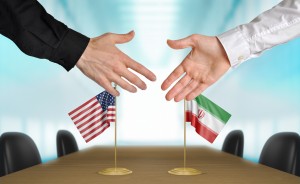By Hayden Smith, Faculty Member, Intelligence Studies, American Military University
The Iran nuclear deal has received a substantial amount of media coverage, especially as it’s brought to the forefront during presidential campaigns. The rhetoric from the left is that the deal will halt Iran’s progress towards constructing a nuclear weapon, while politicians on the right maintain that Iran will still be able to build a nuclear weapon, which would subsequently pose a significant threat to the U.S. and its allies.
Both arguments are wrong.
It is naïve to believe that the deal will prevent Iran from building a nuclear weapon. So, if the right is correct in that Iran can build a bomb, why is their argument still wrong? Simply put, it does not consider the perceptions and goals of Iran’s leaders in the context of the pursuit of a nuclear weapon.
U.S. policymakers must consider the motivations and intentions of Ayatollah Ali Khamenei, Iran’s supreme leader. Using content analysis techniques Operational Code (Walker, Schafer, and Young, 2006) and Image Theory (Cottam, 1994), I assessed his speeches to determine the goals of Iran. While Khamenei has formally issued a fatwa forbidding the building of nuclear weapons under Islamic law, many remain skeptical of his intentions.
Khamenei is more liberal and progressive than his predecessor, Khomeini, and has veto power over nearly every aspect of Iranian politics. He holds particularly strong influence in the area of foreign policy and the military. For this reason, it is important to understand Khamenei’s goals and intentions above Iran’s president.
Although Khamenei has strong political powers, he must still cater rhetoric to the hard-lined conservatives because they do have the power to remove him. He must appease the hard-lined religious conservatives because he did not complete his religious training, due to his intensive participation in the revolution led by Khomeini and his immediate entrance into politics. Thus, he has not been granted the title of Grand Ayatollah and is not the top religious authority.
Contrary to what is portrayed in western media, my assessment found that Khamenei seeks compromise and does not want to engage in conflict. It is important, however, to understand this in context. Khamenei is highly skeptical of the intentions of the U.S. and its allies, due to the tense historical relations.
Iran’s political system is complex and comprised of democratically elected officials as well as political institutions made up of religious clerics. In particular, the Guardians Council, a legislative and judicial branch of Iranian government that is comprised of officials appointed by the Supreme Leader and Parliament, is a very conservative body of clerics that must approve all legislation. But, this is mostly domestic and Khamenei has the majority of control over the military and foreign affairs.
What this means for policymakers and negotiators is that Khamenei is willing to compromise, but he will not be submissive nor cower to bullying techniques; if he is going to compromise, the other side must also be willing to compromise.

References:
Walker, S. G., Schafer, M., & Young, M. D. (2003). Profiling the operational codes of political leaders. The psychological assessment of political leaders: With profiles of Saddam Hussein and Bill Clinton, 215-245.
Cottam, M. L. (1994). Images and intervention: US policies in Latin America. University of Pittsburgh.

Comments are closed.